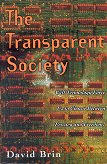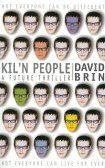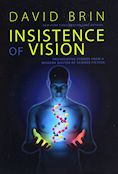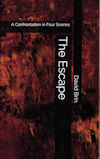Surveillance technology is advancing, and we can't hold it back.
Brin argues that attempts to do so, via privacy and strong
cryptography, are not only doomed to failure, but will make things
worse, as they will protect only the strong. He argues for the
opposite: fewer walls, and more transparency -- and that only in such
an open world can freedom prevail.
In particular, he argues for symmetric transparency, where we can
see them just as much as they can see us. Only with
debate and criticism can errors be uncovered and progress made. It is
easier for the powerful to hide, and they will use secrecy to
hide their inevitable mistakes, unless forced to be transparent.
p81.
the case for monitoring executives is
much greater because their performance is more crucial to company
success, and because their errors ... may have far greater
consequences.
I really, really wanted to dislike this book. I tend to come down on
the privacy side, not seeing why people should know so much
about each other (because not believing such symmetry is even an
option). But Brin weaves a compelling argument for the way the
transparent world could be.
p339, note 45.
What matters to an artist nowadays is
not how many people hate you, but how much attention you can get.
Those who disapprove cannot have you burned at the stake. ... In a
free and diverse society, majority opinion is meaningless to all but
politicians. Sell yourself to a select group. Become a cult figure to
just 5 percent, and you can reap rich rewards of money and ego from
millions, while having the satisfaction of calling the remaining 95
percent idiots. Talk about having your cake and eating it too!
p347, note 123.
it interesting to juxtapose what two
motion pictures from the same franchise say about the toxicity of
ideas. Throughout the film Star
Trek II: The Wrath of Khan, viewers are shown a side plot
about a daring thirst for knowledge. Characters in that film boldly
create an entire solar system, including a planet covered with new
life forms. The story ends with them gazing proudly at their beautiful
creation. But the sequel, written and directed by others, seemed
obsessed with reversing this theme. Step by step, Search
for Spock checked off every box of the "Frankenstein
Syndrome," preaching that humans who arrogate the powers of
heaven will be punished, their false creations destroyed, and the
individual responsible for this act of hubris killed by his own
monster.
He paints an optimistic picture of a transparent society where, even
though they can, people won't invade each other's privacy, out of a
new form of politeness -- they way that people don't just stare at
each other in public nowadays. And also because, with symmetric
transparency, we could stare right back. Call me cynical, but I doubt
it. Never mind the severely disturbed psycho stalkers -- if someone is
looking at me, I have to know that before I can look back at them. And
Brin's symmetry is legal (I have the right), not technological (I have
the knowledge and capability).
The book was written before 9/11, which leads to such prescient
passages as:
p105.
As a mental experiment, let's ... try to
envisage what might have happened if those bombers had actually
succeeded in toppling both towers of New York's World Trade Center,
killing tens of thousands. .... Now picture the public reaction if the
FBI ever managed to show real (or exaggerated) evidence that they were
impeded in preventing the disaster by an inability to tap coded
transmissions sent by the conspirators. They would follow this proof
with a petition for new powers, to prevent the same thing from
happening again. ... once a bureaucracy gets a new prerogative of
surveillance, it is unlikely ever to give it up again.
Post-9/11, the chances of symmetric transparency being an option
have receded dramatically. But Brin makes a point that is now even
more important to bear in mind: we should not assume that we have to
trade off freedom for security; in fact, they increase hand in hand,
and, despite various high-profile atrocities, we in the West live in
both the freest and the most secure world there has ever been.
But despite these caveats, Brin has produced a well-argued,
rational, calm, and thought-provoking book, well worth reading, and
well worth debating.






